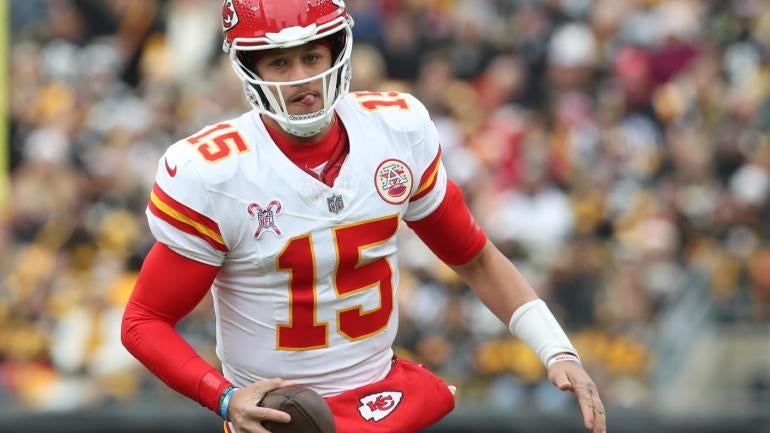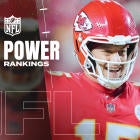
Two Week 17 games with massive playoff implications were settled in overtime where the eventual losers opted to kick game-tying extra points near the end of regulation. They could have tried go-ahead two-points attempts to potentially pull ahead for good.
First, the Broncos lost to the Bengals on Saturday after tying the game with eight seconds left in regulation on a miraculous 25-yard touchdown catch by Marvin Mims Jr.. Sean Payton explained the Broncos went for the extra point because a tie would have clinched a playoff spot for Denver.
"If the tie element didn't sit in there, it probably would've been a little easier decision," Payton said. "I was comfortable with the decision. We had plenty of time with the decision.
"We discussed it all," Payton said. "Plenty of time, plenty of time, plenty of time and the decision we made is the right one. ... A lot of it is your gut relative to how the toss goes. We were moving a little bit on offense, and then weighing the percentages of the two-point conversion. I think that had a lot do with it."
Cincinnati eventually won on a Joe Burrow touchdown pass to Tee Higgins on the Bengals' third possession in overtime. Part of me understands Payton's reasoning about a tie, but what were the odds of tying the Bengals and their high-powered offense? Probably very low.
Then, on Sunday night, the Falcons cut the Commanders lead to one point on an incredible fourth-down touchdown pass from Michael Penix Jr. to Kyle Pitts with 1:19 left in regulation. They opted to kick the game-tying extra point instead of going for two.
Raheem Morris said he never considered going for two. Atlanta actually got the ball back and could have gotten into field goal position to win at the end of regulation had Morris used both of his timeouts. Washington eventually won the coin toss in overtime and did what many teams do in these spots with elite quarterbacks. Jayden Daniels led a game-winning touchdown drive on the opening possession of overtime.
Both situations have their differences, but ultimately I question the Falcons and Broncos for going for the tie with their playoff lives on the line. In Atlanta's case, if they convert a two-point try, Jayden Daniels gets one chance with one minute left to lead a game-winning field goal drive. In Denver's case, if they convert, they basically win the game with under 10 seconds left and Joe Burrow doesn't get to touch the ball.
I'd like to see more teams be aggressive in these spots, especially when there are great quarterbacks on the other sideline. Teams need to be limiting their possessions. Daniels' ended up getting two more cracks at the ball after the Falcons tied it and Burrow got three more cracks at it.
You could argue it's a case of "you're damned if you do, you're damned if you don't." Just two weeks prior the Saints lost to the Commanders on a game-winning two-point try at the buzzer. In Week 10, the Bengals lost to the Ravens on a game-winning two-point try in the closing seconds of a track meet with Baltimore. At least they knew what they were up against and had the guts to go for it (and the referees missed blatant penalties on the two-point try).
Still, numbers don't lie. Teams have a 2-10 record this season when scoring a touchdown to cut a deficit to exactly one point in the final two minutes. The common denominator? Teams opted to go for two in just three of those 12 cases. Not a high enough rate.
Scored touchdown to cut deficit to exactly one point in final 2 minutes this season
- Final 2 minutes: 2-10 record (1-3 with two-point try | 1-7 with extra point)
- Final minute: 1-7 record (1-3 with two point try | 1-4 with extra point)
- Final 30 seconds: 1-4 record (1-2 with two point try | 0-2 with extra point)
Here's all 12 situations below:
Scored touchdown to cut deficit to exactly one point in final 2 minutes this season
| Week | Team | Time Left | Conv | Opponent | Opposing QB | Result |
|---|---|---|---|---|---|---|
3 | Rams | 1:51 | XP | 49ers | Purdy | Won |
8 | Jaguars | 1:44 | XP | Packers | Willis | Lost |
9 | Patriots | 0:00 | XP | Titans | Rudolph | Lost |
9 | Dolphins | 1:45 | XP | Bills | Allen | Lost |
9 | Seahawks | 0:57 | XP | Rams | Stafford | Lost |
9 | Buccaneers | 0:27 | XP | Chiefs | Mahomes | Lost |
10 | Bengals | 0:38 | 2-pt | Ravens | Jackson | Lost |
12 | Commanders | 0:33 | XP | Cowboys | Rush | Lost |
13 | Colts | 0:17 | 2-pt | Patriots | Maye | Won |
15 | Saints | 0:00 | 2-pt | Commanders | Daniels | Lost |
17 | Broncos | 0:08 | XP | Bengals | Burrow | Lost |
17 | Falcons | 1:19 | XP | Commanders | Daniels | Lost |
The most questionable call came in Week 9 between the Buccaneers and Chiefs on 'Monday Night Football' Tampa Bay scored with just under 30 seconds left and opted to kick a game-tying extra point. Patrick Mahomes didn't lead the game-winning field goal drive most probably thought he would at the end of regulation. But, Kansas City won the overtime coin toss and scored a game-winning touchdown on the opening possession.
Mahomes improved to 6-0 in overtime in his regular-season career and added to his impressive overtime resume (scored on seven of nine opening overtime possessions with Mahomes: four touchdowns, three field goals)
Somehow, Todd Bowles said he gave little thought to going for two despite the GOAT on the opposite sideline.
"Very minor. We wanted to get it to overtime," he said, via the official transcript. "With the wet conditions on the field, we wanted overtime instead of going for two. We had our shots, and we lost the game."
Perhaps he didn't see the Super Bowl. Either way, if there's an opportunity to take the ball out of a great quarterback hands, or put them in a tougher situation where they have very little time to engineer a game-winning drive, you need to seriously consider it.
It might even fly in the face of the "right decision" if going by analytics. In Tampa's case, the win probability was actually better based on the decision to kick the extra point. But the analytic models don't account for who is on the opposite sideline!
The Ravens had the right idea in Week 1, to their credit. They were going to go for two had the Isaiah Likely touchdown at the end of the fourth quarter not been overturned (which would have cut the lead to one).
Since 2000, teams have won more often when they go for go-ahead two-point tries in the final two minutes of the fourth quarter, instead of game-tying extra points. The disparity is even larger with these decisions in the final 30 seconds, when the two-point attempts are really do-or-die and opponents don't have much time left (if any) to lead a game-winning field goal drive (if a two-point try is converted).
Records since 2000 after touchdown to cut deficit to exactly one point
| Kick Extra Point | Go For Two-Point Conv | |
|---|---|---|
Final 2:00 | 62-97-5 (.393 win pct) | 15-18 (.455 win pct) |
Final 1:00 | 37-52-2 (.409 win pct) | 11-17 (.393 win pct) |
Final :30 | 18-37-1 (.330 win pct) | 7-11 (.389 win pct) |
Remember, making the extra point isn't even a given. In Week 12, the Commanders pulled to within one vs. the Cowboys in a miraculous touchdown pass with 33 seconds left. They missed the game-tying extra point and Dallas sealed the game by returning an onside kick for a touchdown. Teams are 33 of 36 on game-tying extra points in the final two minutes since 2000.
Of course, you could still lose even if you convert a go-ahead two-point attempt. That's actually happened on two of the 33 go-ahead two-point attempts in the final two minutes since 2000. I'd still rather lose that way than missing the game-tying extra-point!
Now, there's no one-size fits all answer as the answers by Sean Payton and Todd Bowles this year touched on. Each situation must be treated on a case-by-case basis based on the game flow, each team's offense and defense, their opponents, confidence in a two-point play, the weather, and numerous other factors.
But the numbers show going for two leads to winning more often and teams are starting to catch on, just not quickly enough.
In the last seven seasons, teams are going for the go-ahead two-point try in the final two minutes 34% of the time, compared with 8% in the previous 18 seasons.
The number jumps to 42% in the final 30 seconds of the last seven seasons. Teams have a 5-6 record when they go for two in those spots, vs. 3-11-1 when going for the extra point.
Percent of time trying go-ahead two-point attempt
| 2000-17 | 2018-24 | |
|---|---|---|
Final 2:00 | 8% | 34% |
Final 1:00 | 13% | 43% |
Final :30 | 15% | 42% |
42% of the time is not high enough. It's trending in the right direction, just like we are seeing teams get much more aggressive on two-point tries when down exactly eight points (36% of the time in the second half this year), to the applause of the analytics community.
Overall success rates are down on two–point attempts. The conversion rate is 40.5% this year, the worst since at least 2000.
Despite that, I would take my chances, especially if there are great quarterbacks on the other sideline like we saw in Week 17. Again, teams are 2-10 this year when scoring a touchdown to cut a deficit to exactly one point in the final two minutes of regulation. The record is 1-7 in the final one minute and 1-4 in the final 30 seconds.
Not enough teams have rolled the dice this year. Hopefully they won't make the same mistake in the playoffs if they have a chance to land a knockout punch on MVP-caliber quarterbacks like Patrick Mahomes, Josh Allen or Lamar Jackson.
If you have a chance to win the game in the final 20-30 seconds especially, meaning the other team has very little time to mount their own game-winning drive in return, roll the dice! I know Dan Campbell wouldn't leave it up to a coin flip or the other team getting the ball in a tie game. I'd rather have the ball in my hands with the game on the line than in the hands of an elite quarterback on the other team, that's for sure. Shoot your shot!

















